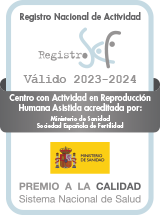Implantation
What is implantation?
Implantation is the process in which the embryo attaches itself to the inner wall of the uterus (called the endometrium) and penetrates the uterus to develop further. Implantation occurs when the embryo is at the blastocyst stage, about 5 to 6 days after its formation. When the embryo transfer takes place 2 to 3 days after oocyte retrieval, the embryo continues its cell division inside the uterus and does not implant until 2 to 4 days later.
Are all embryos implanted?
Human reproduction has many errors, and a high proportion of embryos do not have the capacity to evolve. This is one of the problems in deciding how many embryos to transfer, as this proportion of embryos that evolve is highly variable.
What factors influence embryo implantation?
For implantation to take place, the endometrium must be perfectly prepared, the embryo must have developmental potential and there must be a rapport between the changes that occur in both.
What influence does the patient’s age have?
The age of the patient does not necessarily affect the capacity of the endometrium to receive the embryo, but it has a great influence on the vitality of the embryos.
With age, the possibility increases that the oocytes present poorer quality at the cytoplasmic level and that meiosis (separation of the chromosomes) is completed in a pathological way. The latter gives rise to embryos that do not evolve because they have alterations in the genetic code.
There is a proportion of embryos that block their development in the first stages of division, this proportion increases in direct relation to maternal age.



